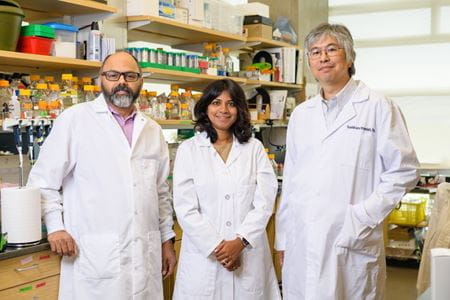As a leader in vision research, the IU School of Medicine Department of Ophthalmology received a significant boost in 2024 with three basic and translational science researchers earning prestigious Research Project Grants (R01s) from the National Eye Institute (NEI). Yoshikazu Imanishi, PhD, MSC, BSC, Padmanabhan Pattabiraman, PhD, and Tasneem Sharma, PhD, received R01s, gaining vital funding support for the department’s continuing research and innovation in glaucoma and the genetic causes of blindness.
“The grants our scientists received this year speak volumes about the quality of the research we’re producing in the Department of Ophthalmology,” said Ashay Bhatwadekar, PhD, RPh, FARVO, interim director of basic and translational research. “In addition to being strongly committed to research, our faculty are also motivated to apply for grants, many of which are highly competitive.”
NEI R01 Grants Earned in 2024
Yoshikazu Imanishi, PhD, MSC, BSC, Associate Professor of Ophthalmology; Letzter Scholar in Ophthalmology; Director of Ocular Neurobiology, IU School of Medicine Stark Neurosciences Research Institute
The director of research mentoring in the Department of Ophthalmology, Dr. Imanishi earned his fourth R01 grant in 2024. The grant from the NEI will support research investigating the genetic causes of blindness.
“This grant aims to help us develop treatments and possibly find a cure for people who have retinitis pigmentosa, a condition caused by specific genetic mutations,” said Dr. Imanishi, who focuses on developing novel therapeutic strategies to treat inherited blinding disorders. With this R01, Dr. Imanishi seeks to understand why proteins in photoreceptor neurons — specialized cells in the retina responsible for converting light into electrical signals that reach the brain — become misplaced and cause blindness. He also studies how different parts of the cells are organized and supported by cytoskeletal elements, which give shape to the cells.
Padmanabhan Pattabiraman, PhD, Assistant Professor of Ophthalmology
The recipient of two NEI R01 awards, Dr. Pattabiraman focuses on understanding how intraocular pressure is regulated. High eye pressure is a risk factor for primary open-angle glaucoma, Dr.Pattabiraman’s main area of study. His laboratory at IU School of Medicine investigates how eye pressure builds, with a goal of identifying mechanistic aspects that can lower the pressure. Dr. Pattabiraman is using his most recent R01 grant to examine the relevance of sterol regulator element binding proteins (SREBPs) in ocular hypertension and glaucoma. This investigation of SREBPs — a novel molecular mechanism that regulates the outflow of aqueous humor — aims to uncover new therapies for high eye pressure and glaucoma.
“We apply a lot of scientific curiosity to understanding how eye pressure is regulated and how we can regulate the pressure to prevent vision loss from glaucoma,” said Dr. Pattabiraman. “These questions are where we’re putting our heart and soul to help patients — many of whom are in their 70s and 80s — avoid losing their vision and quality of life.”
Tasneem Sharma, PhD, Assistant Professor of Ophthalmology
Dr. Sharma received her first NIH R01 award this year for glaucoma research focused on protecting retinal ganglion cells (RGCs). When RGCs are injured or lost, glaucoma is more likely to occur.
“Regardless of what type of glaucoma is present, the end game is the loss of the retinal ganglion cells,” said Dr. Sharma, whose research focuses on the disease’s earliest stages. “It’s crucial to identify therapies and develop new glaucoma treatments that rescue retinal ganglion cells and promote their survival.”
Using preclinical human eye models, Dr. Sharma’s research tests an innovative regenerative therapy called neuritin that is designed to save RGCs from neurodegeneration. She is the first vision scientist to attempt research that combines the testing of human neurons with this therapy.
“We’re excited about the potential for a breakthrough discovery that targets survival and regeneration of retinal ganglion cells,” said Dr. Sharma. “This grant will be instrumental in our research to validate an innovative therapeutic strategy for glaucoma.”
